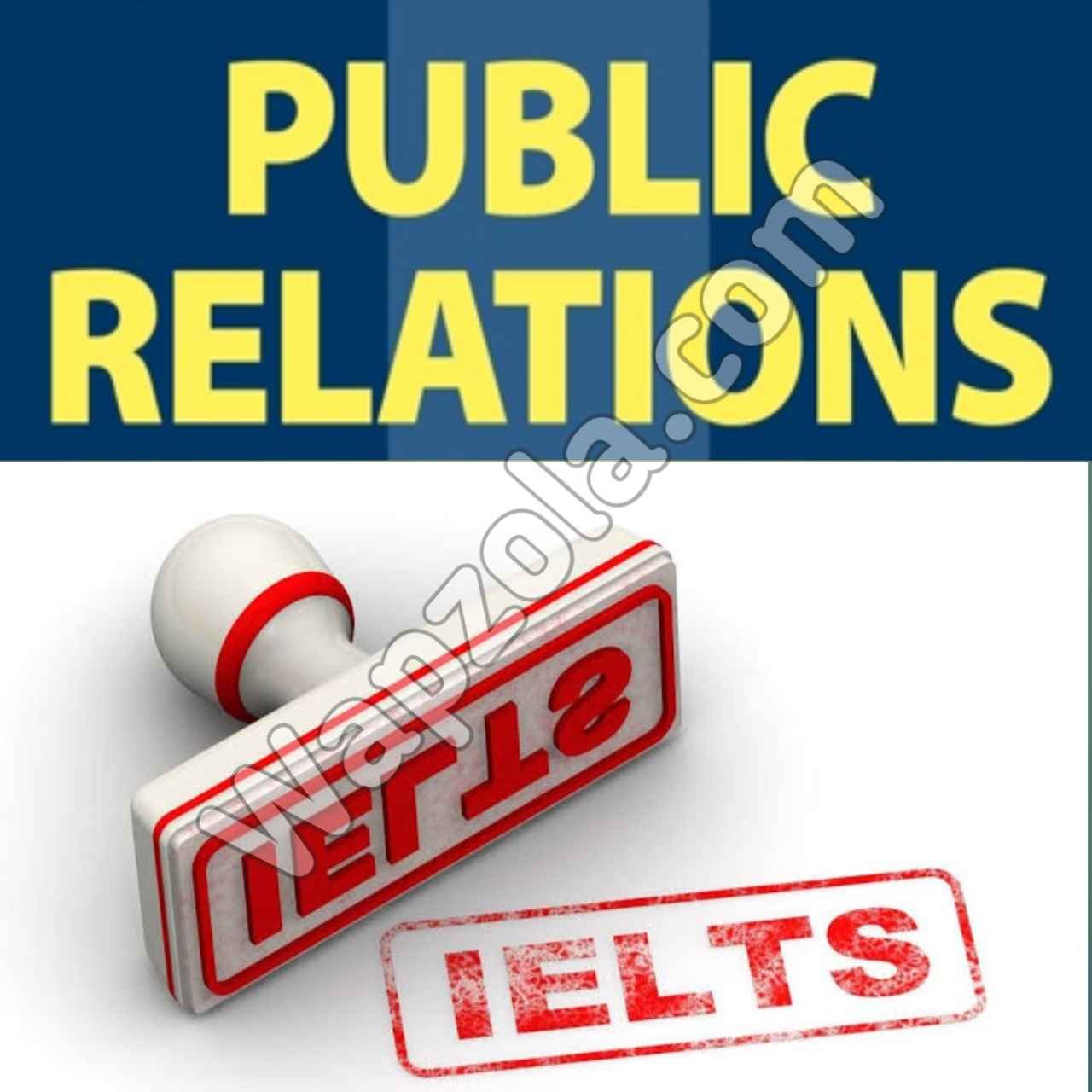Table of Contents
IELTS, which helped establish the four-skill English language testing format 30 years ago, is still the gold standard for English language exams today. IELTS is used by the governments of Australia, Canada, New Zealand, and the United Kingdom to process immigration requests. Public relations is of course one of the course people like to study in one of the countries above. It is a course which helps people study inorder to know how to deal with people of the public.

Study_IELTS_for_Public_Relations_In_United_Kingdom
Public relations also gives you the persuasive communication and marketing abilities required to manage the reputation of significant clients and shape media perception. However, if you want to study Public relations in the United Kingdom using IELTS. This is the step on how to prepare for IETLS exams.
Step By Step Process To Study IELTS for Public Relations In UK
Step 1- Know The Test.
Now, what does this mean?. It means that you have to know exactly what you’re about to face. I’ve met many test takers who’ve taken the test maybe several times, and the first two or three times they got a really low score because they still didn’t really know what was coming. Right? They didn’t understand how the test is structured, what the timing is like, all of these things.
So, know the test, means: Know the structure. There are four sections; listening, reading, writing, speaking. Make sure you know how each of them works, how much time is going to be used for each one. In the listening section you have four sections, in the reading section you have three passages to read, in the writing sections you have two tasks that you have to complete. In the speaking section you’re going to be speaking with a native English speaker face to face, one on one for about 12 to 15 minutes. Make sure you know exactly what they’re going to be asking you, what you’re going to be expected to answer back. So know the structure of the test.
Step 2- Know The Timing.
You have 40 minutes, roughly, for the listening section, including a 10-minute time allotment for copying your answers from the question sheet to an answer sheet. This is very, very important.
Know when to do that. If you have finished writing your answers on your answer sheet before the 10 minutes are up, you can’t go to the reading section.
You have to sit and wait, close your eyes, relax, and so on. Make sure you know the question types that you’re going to face in the listening, and the reading, and the writing of Public Relations, and the speaking. Knowing the question types will make sure that you aren’t surprised by anything.
You do not want to have surprises on test day. Know the question types, prepare for them, begin to think about how to answer them. Make sure you know all the directions.
Every section of the test will have its own set of directions. Do not spend time reading these or listening to these during the test. You should know all of the directions long beforehand, you should memorize them. That way, you don’t spend time reading
them, you go straight to the task at hand.
Step 3-Practice The Test.
Now, I don’t mean do, like, 10 minutes here, 10 minutes there, 15 minutes here. I want you to sit down at least once a week from the time you registered or started thinking about it until the actual test day. There are lots of places where you can get full practice tests. The Cambridge books are excellent for that. They are past papers and they’re real tests.
Make sure that you do a full test at least once a week from beginning to the end. Give yourself three full hours undistracted. Now, what does this mean? When you go to the official test centre you cannot take your phone in with you. You do not have internet, you do not have music, you do not have anything. You have you in a room with a bunch of other people. The listening is for everybody, it’s on the speakers. And the reading, and the writing, everything is by yourself, quiet in a quiet room. Get used to this situation. I want you to take the full test start to finish undistracted. Lock yourself in a room every Saturday morning, for example, tell all your friends and your family not to disturb you. Leave your phone outside the room, don’t even take it inside with you, and do it exactly as you would on test day.
Get used to that way of doing things. Now, if you do the full practice test a few times before the real test then you will also understand what it’s like to sit for three hours or at least two hours and 40 minutes and focus on the test. Now, the speaking section may be a few minutes after the paper test, it may be a few hours later, it may be the next day. Get used to that idea, but learn to focus for a long stretch of time on English.
Speaking.
Now, speaking is a little bit difficult because you’re not going to have somebody to interview. But get one of your friends or even get online, you can get some people even just to say the questions. Get somebody to feed you the questions and just practice answering them. Record yourself. Record the answers, and then listen and try to give yourself feedback. But I’m going to talk about feedback in a minute.
Step 4- Strategize.
It means create a strategy for yourself in what scores you need and what your overall objectives are. So, start by knowing the scores you need overall and individually.So let me give you an example. You have person A and person B. Let’s say person C, too. Each of you needs different things. One of you needs an overall 6.5, that’s it. Doesn’t matter what you get in each individual section. Overall, you need a 6.5. Person B needs an overall of 7, with a minimum of 7 in each category, in each section. And person A needs a 7.5 overall or a 7 overall, but a minimum 7.5 in writing and reading. These are just examples. There’s all sorts of combinations. Now, first of all: How do you know what score you need?
Well, if you’re applying for a university. If you’re applying for a university, go to the
website of the department or the faculty you’re applying for, they will tell you
exactly what scores you need. If you’re applying for immigration, go to the UK website of the country you’re applying to, they will tell you what scores you need, and if you need overall scores or if you need individual section scores.
Now, once you know the overall score or the particular things you need, then you can create a strategy. So let’s say you need an overall 7 band, 7.0 band and it doesn’t matter what you get in each section. This gives you a lot of opportunities because if you are a very weak writer, for example, then you can aim for a 6 in the writing section, you can then aim for an 8 in the reading section, and your overall will be 7, assuming you got 7 or higher in speaking and listening. If you don’t need individual scores, then you can play with the different categories and you can focus your energy on your strong sections, on your strong skills, and just do enough in your weak skills and then get your average. But if you need specific scores, then those are the sections you’re going to start working the hardest on.
Now, person A needs as 7.5 in writing. For most people who take this test, and you can even find research on the IELTS website that will confirm this, most people that take the
IELTS test score the lowest in the writing section.
This is the hardest of the four skills. If you need a high writing score, then start working on your writing first. Before you practice listening, before you practice reading, before you practice speaking, start working on your writing because that is going to take you the longest time to improve your score on, to get the skills you need, and to get the structures you need, etc.,the vocabulary. If you need, for example, the highest score in listening, which is not really common, but it happens, if you need the highest score in listening start listening all the time to English; TV shows, radio shows.
Conclusion
Focus on the sections that are weakest first, and make sure you make up with the strongest for those. Have a plan for reading. Again, you’re going to be given three passages to read with a total of 40 questions about those passages. Have a plan.
There are different strategies. If you look on engVid in the search box, you’ll find videos on different ways to approach the reading section and a lot of other videos on how to deal with all of these sections. But very, very important that you have a plan for reading; very, very important that you practice your writing skills.
To study public relations abroad helps a person increase brand credibility and helps you gain more advantage in the labour market, moreso using IELTS in the United Kingdom opportunity. Prepare well.

